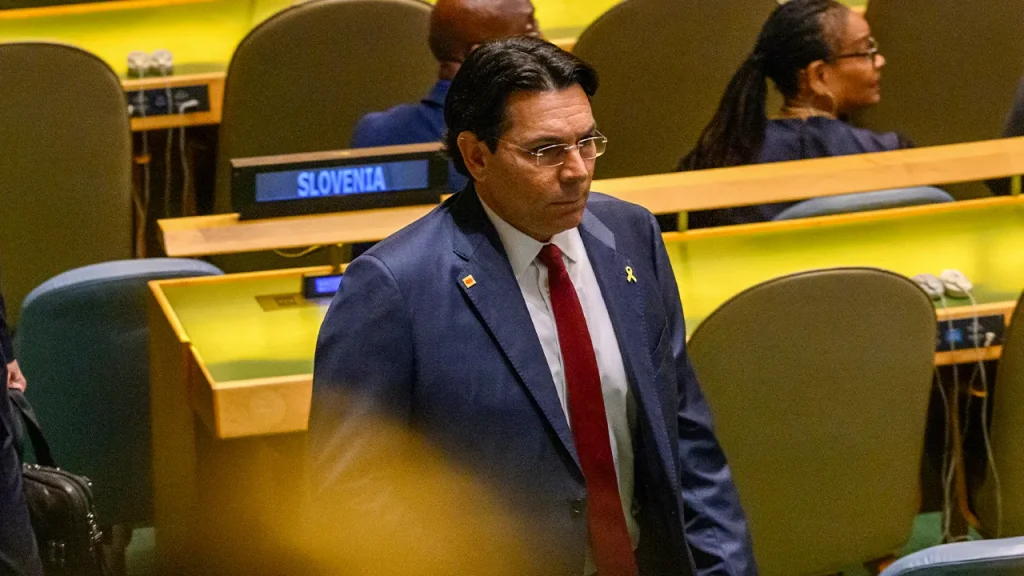Israel’s UN Ambassador Defends Netanyahu and Challenges International Diplomatic Tensions
In the wake of a tense United Nations General Assembly session, Israeli Ambassador to the UN Danny Danon offered a candid assessment of the diplomatic theater that unfolded during Prime Minister Benjamin Netanyahu’s address. The session, marked by walkouts and scheduling controversies, highlighted the complex and often contentious relationship between Israel and international bodies. Danon characterized the walkout during Netanyahu’s speech as a “staged” affair, noting that many participants were staffers from “hostile missions” rather than actual diplomats. More pointedly, he observed that these individuals arrived solely to participate in the protest before immediately departing. “I told them, ‘get out and don’t come back,’ and I meant it,” Danon stated firmly, suggesting that those unwilling to listen to Israel’s representative had no place in diplomatic discussions. Despite the walkout, he emphasized that most delegations remained present and showed respect for both the Prime Minister and Israel as a nation.
Perhaps the most innovative aspect of Netanyahu’s address was his revelation that his speech was being broadcast directly to Gaza residents via speakers and cell phones. Danon explained this as a “brilliant idea” aligned with the Prime Minister’s strategic communication approach. This tactic wasn’t aimed at Hamas leadership, who Danon claimed “don’t care” and only respond to military force, but rather at ordinary Gazans and the hostages still being held in the territory. This direct communication channel represented an unusual diplomatic maneuver, bypassing formal international channels to speak directly to people caught in the conflict. The move underscored Israel’s frustration with traditional diplomatic pathways while attempting to distinguish between Hamas leadership and Palestinian civilians.
A particularly contentious issue raised by Danon was the scheduling of key Middle East discussions during Rosh Hashanah, effectively excluding Israeli representation during talks directly concerning their nation. “They had a discussion about the Middle East, about Israel, without Israel. I think it shows the hypocrisy of the United Nations,” Danon remarked with evident frustration. Despite his efforts to engage with the UN Security Council leadership about rescheduling, no accommodation was made. This scheduling conflict highlighted what many Israeli officials view as systemic bias within international institutions, where procedural decisions can result in the exclusion of key stakeholders from critical conversations about their own security and sovereignty.
The 80th session of the UN General Assembly featured significant pressure on Israel both within and outside official proceedings, with several nations including France, Australia, the United Kingdom, and Canada moving to recognize Palestinian statehood. Ambassador Danon dismissed these declarations as “empty” gestures devoid of practical impact. He noted that Israel had successfully persuaded several unnamed countries not to join what he described as a “circus” of recognition statements. When questioned about the motivations behind these recognition moves, Danon attributed them primarily to domestic political considerations. Using French President Emmanuel Macron as an example, he suggested that leaders facing internal challenges on issues like economy and immigration find it expedient to take positions on the Middle East conflict to mobilize domestic support, rather than pursuing substantive diplomatic progress.
Despite these tensions, a potential turning point emerged when Netanyahu met with President Donald Trump at the White House and subsequently accepted a US-backed Gaza deal aimed at ending the nearly two-year conflict. This development prompted responses from international leaders, including President Macron, who expressed support for the plan while calling on Hamas to release all hostages and adhere to the agreement’s terms. The French president’s statement reflected the complex interplay between diplomatic recognition of Palestinian statehood and practical expectations for resolving the ongoing conflict. This moment illustrated how even amid contentious diplomatic posturing, pathways for practical resolution remain part of the international conversation.
The current diplomatic landscape surrounding Israel at the United Nations reveals deep divisions in perspectives and approaches to Middle East peace. Ambassador Danon’s comments highlight Israel’s frustration with what it perceives as performative diplomacy and procedural inequities within international institutions. At the same time, moves toward Palestinian statehood recognition by several Western nations signal shifting international sentiment, even as practical implementation remains uncertain. As the potential Gaza deal awaits Hamas’s response, the international community faces the perennial challenge of translating diplomatic positions into tangible peace outcomes. The tensions displayed at this UN General Assembly session ultimately reflect the enduring struggle to find diplomatic mechanisms capable of addressing one of the world’s most persistent conflicts, where symbolic gestures and practical negotiations continue to unfold in parallel, sometimes complementary and sometimes contradictory tracks.


